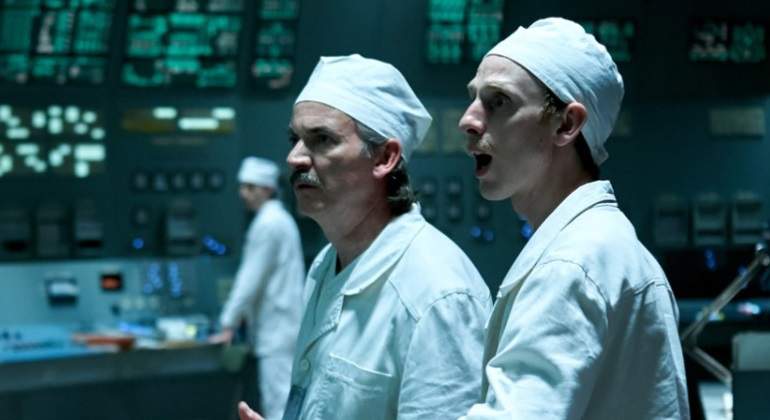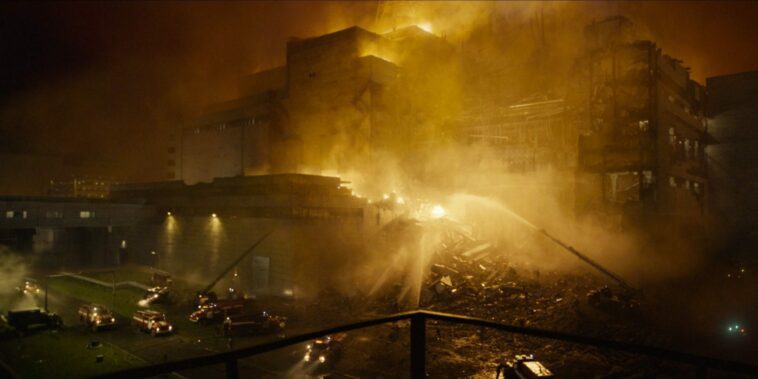This week, HBO’s highly anticipated five part miniseries, Chernobyl, premiered. Based on the actual events surrounding the accident in the Soviet Union in 1986, the miniseries delivered a powerful first hour, chalked full of human terror, carnage and powerful men making decisions affecting the lives of millions behind closed doors. This first hour was certainly not for the faint of heart. While it wasn’t slasher movie gory, director Johan Renck did not shy away from showing us exactly how bad these injuries were. The episode revolved around the accident at the plant and how everything went down immediately after. This was not a plot heavy hour, although the seeds were certainly planted for a rich narrative to follow in the coming four weeks.
The episode opened two years after the accident, with Jared Harris of Mad Men fame documenting secrets surrounding Chernobyl onto a tape, before wrapping the tape up and taking it outside and carefully hiding it, all while a mysterious car across the street seemingly watched on. Based on the looks of his apartment, Valery Legasov (Jared Harris) had not been doing well for himself since his time investigating the disaster. Moments after hiding the tape outside, Legasov hung himself in his own home, starting the story off on a mysterious note that while wasn’t paid off in this episode, seems to indicate that future episodes will be much more plot heavy.
Much like the real world confusion over the accident in Chernobyl, the series didn’t offer much clarification on how it happened. For most of the episode, we followed around a group of scientists, each reacting to the pure terror of a nuclear accident differently. There was almost this sense of disbelief from the man in charge, who refused to acknowledge that the core reactor had been destroyed and kept insisting that his men follow his orders and cool down the now destroyed core with water. The other men, despite reluctance, followed orders and lives were lost. Not only the scientists inside the facility but also many firefighters, who had been called to the scene, reacting as if this were a fire, completely unaware of what true danger had just been unleashed here.

One of the most fascinating elements of the episode was the scene that involved several well dressed men and the lead scientist in a room that was described as being safe from the nuclear accident that had occurred hours earlier. These men were gathered in the middle of the night to not only assess the situation but to figure out what to do moving forward. The oldest man in the room was quiet for most of the scene until he stood, instantly gathering everyone’s attention and demanding that the phones be disconnected and word of this to not be spread. He gave a rather rousing speech, essentially telling these men that burying this situation was their destiny and they would be heroes for doing so. Considering the relationship the rest of the world had with the Soviet Union at the time, this felt like something that actually could’ve happened. The Soviets let little to no information out at the time so was there this “secret society” of decisionmakers agreeing to act as if this nuclear mistake hadn’t happened? I’m not sure but this group and their decision surely will be a primary focus moving forward.
One of the most devastating parts of the episode was how many people gathered near the plant to watch what they thought was a unique orange and blue flame in the sky. People holding infants, children playing, all shot in slow motion with a perfect score playing behind it really drove home how oblivious the local people were to what was happening in their neighborhood. I sat in awe, black ash landing on the onlookers almost as if it were dirty snow and they were none the wiser what they were subjecting themselves and their children too. It was beautifully shot, completely heartbreaking and made me furious that a government could withhold so much from the local people. Perhaps ignorance is bliss, until you die from it.
The biggest takeaway from this episode wasn’t any plotpoint or something from the narrative, it was how remarkable of a job Renck did filming this hour of television. From the way the scientists conveyed so much with so little, to the beautiful outside exteriors, this was a heavy hour of TV that handled one of mankind’s biggest disasters that we still know so little about absolutely perfectly. As a viewer, I asked myself what I would be doing if I were in the scientist’s position. How would I react knowing the potential for damage and loss of life that was unfolding before us? My heart broke for the onlookers, thinking they were simply admiring a site in the sky they could smile about years later when they reflected on it. The suspense is there for future episodes to tell a story of deception, lies and cover-ups. We know its coming and have even seen two years into the future. Chernobyl has a lot of potential to tell an amazing story over the next four hours of this miniseries.

